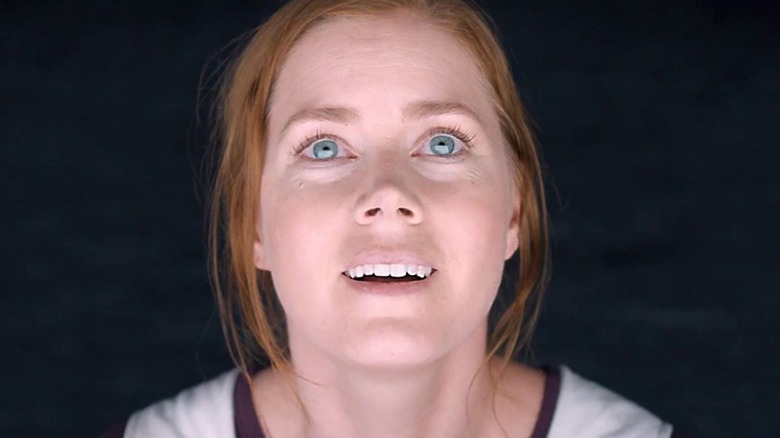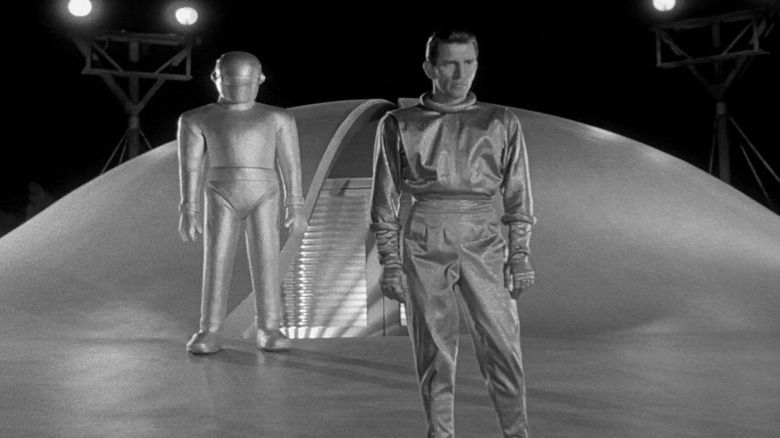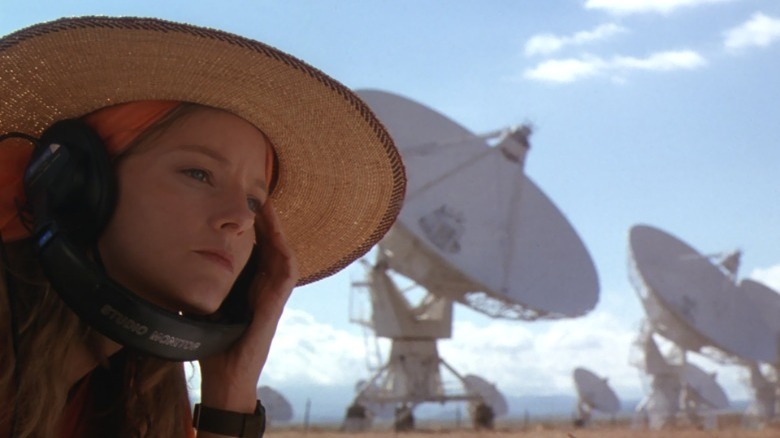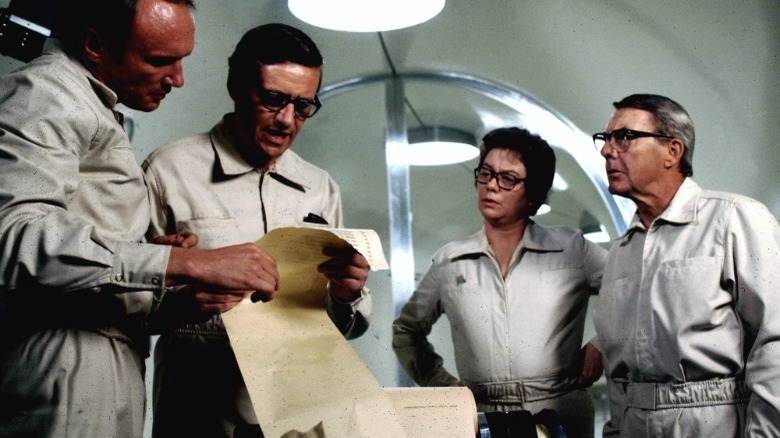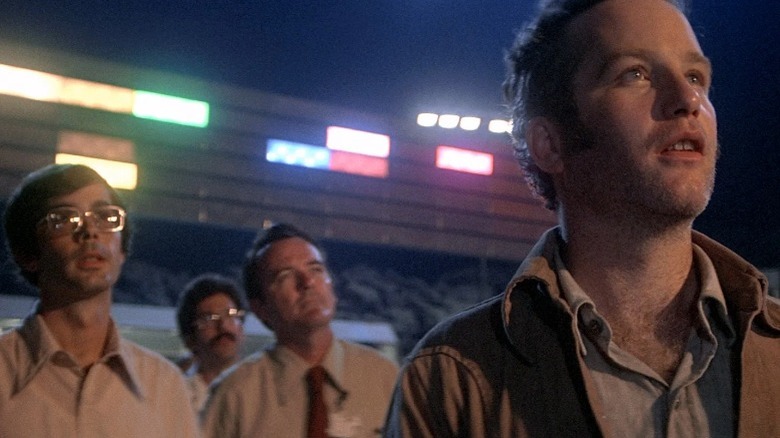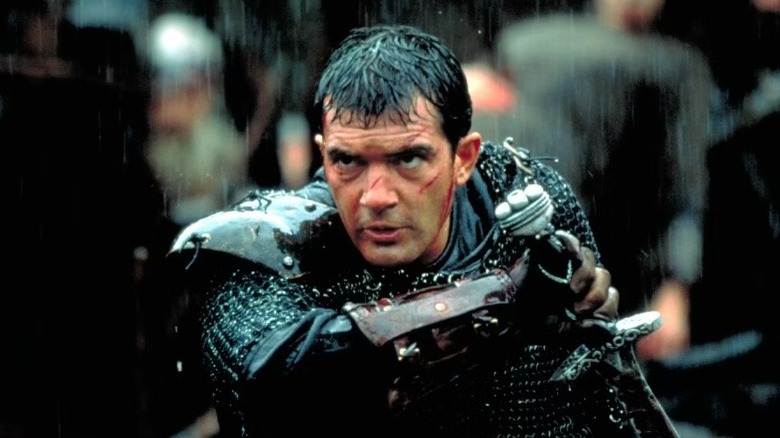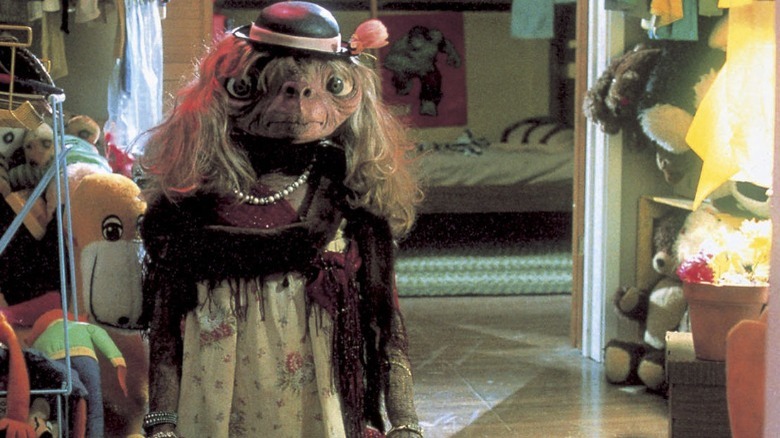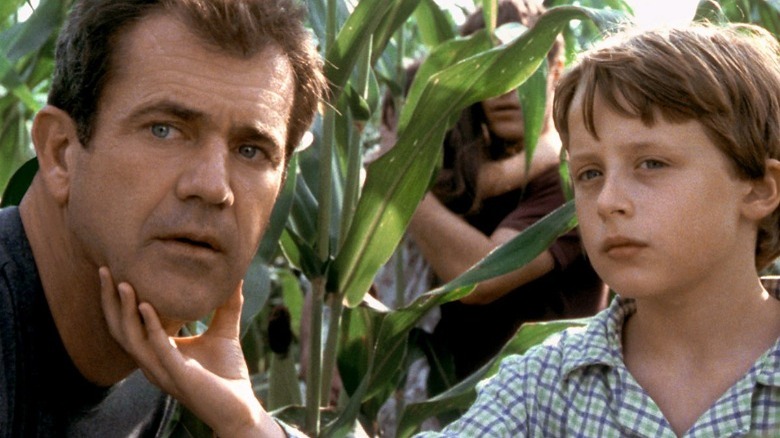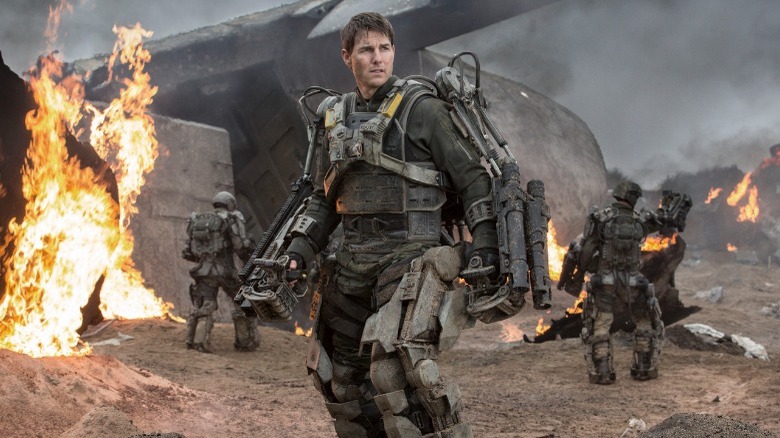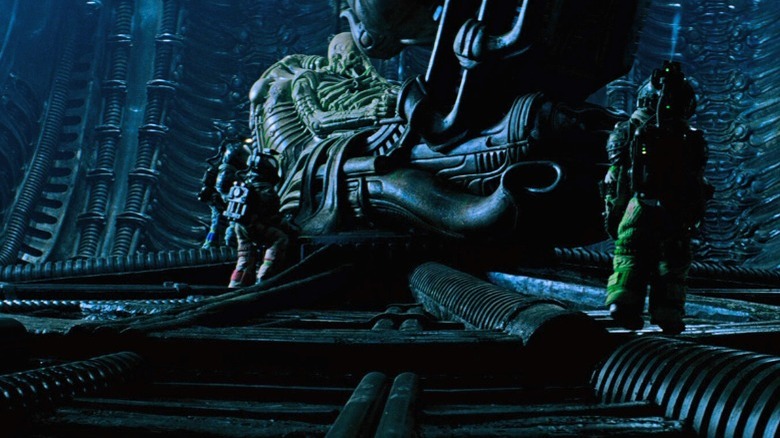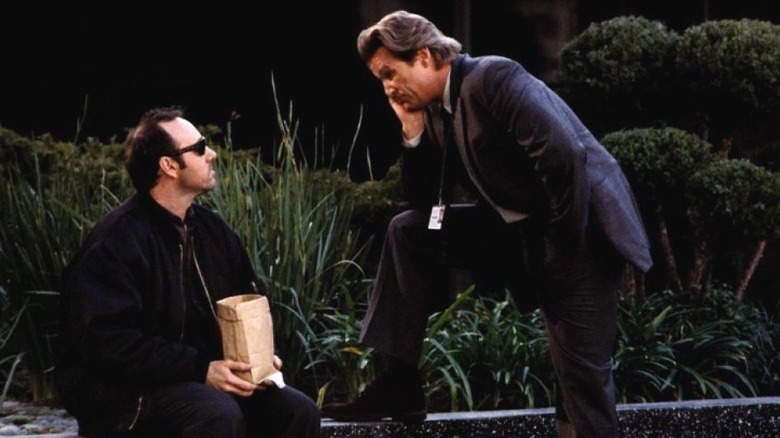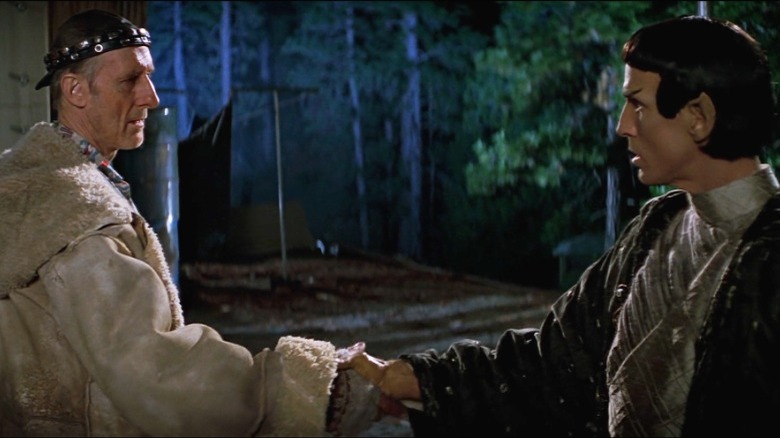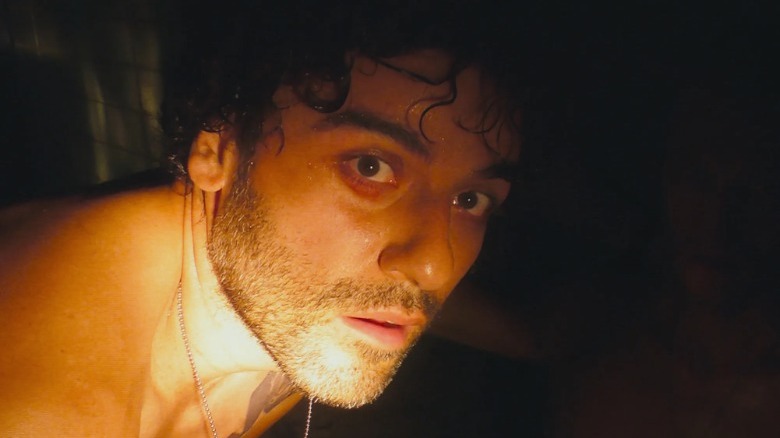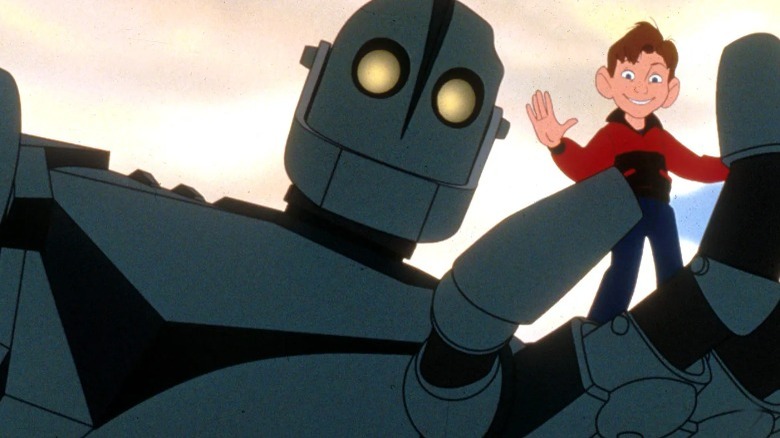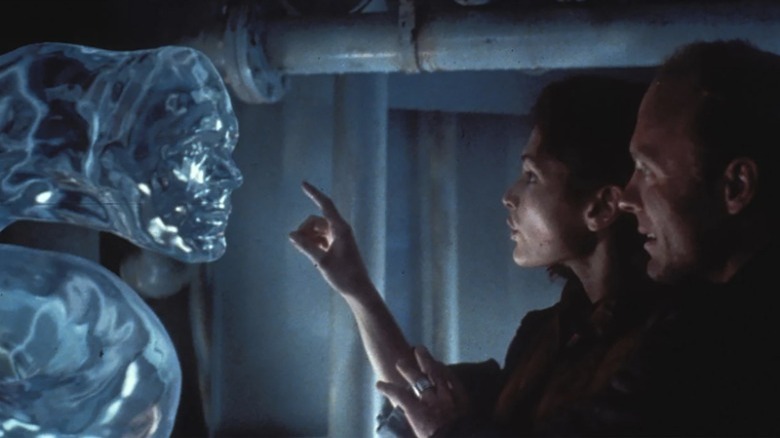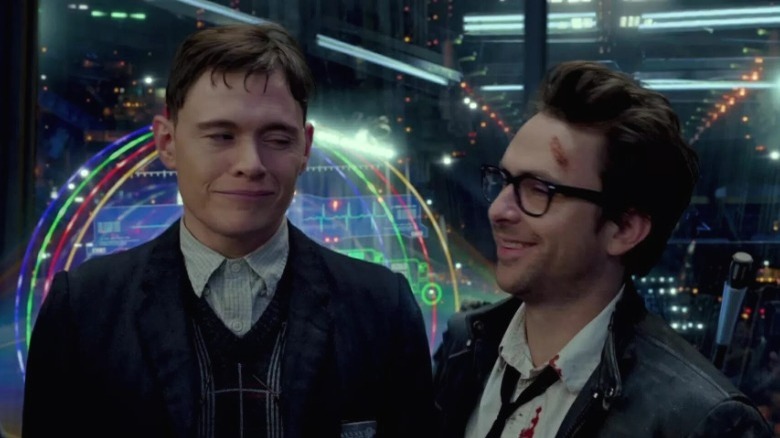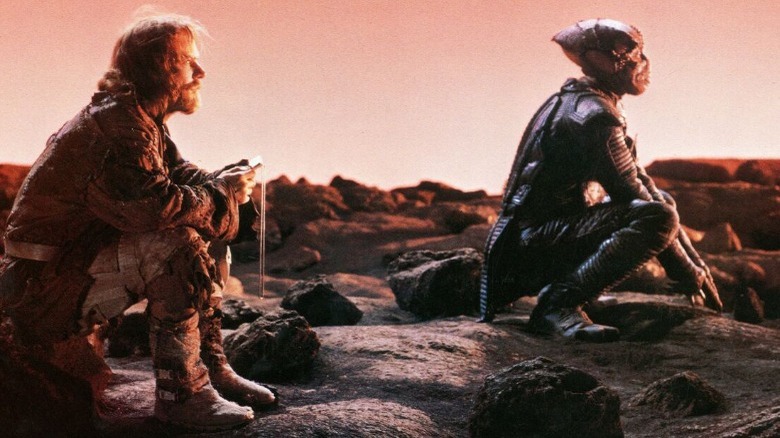16 Movies Like Arrival That You Definitely Need To See
We may receive a commission on purchases made from links.
Communication is the key to successful first contact scenarios. The empathic relationship that language can create between two dissimilar peoples is a source of optimism in both in fiction and in real life. Consider, if you will, Denis Villeneuve's 2016 film, "Arrival." It may not be the first big movie about forging a connection between humans and aliens, but the way that its story never loses its focus on linguist Louise Banks (Amy Adams) allows that link to feel bigger and more poignant because of how personal it becomes.
What Banks discovers is that humanity must evolve, so that we can save others at some future date, and that language is the key to doing so. It's a poignant lesson, as we realize that, in learning it, Dr. Banks must face her destiny with her eyes wide open, fully aware of what she'll lose. It's also painful, because so much terror and paranoia stands in the way of her success.
"Arrival" remains one of the best first contact movies to date, in part because it doesn't shy away from discussing some of the difficult issues that might arise when we cross paths with visitors from the stars. But it, like Louise, is not alone. These 16 movies evoke much of the same spirit as "Arrival," and teach similar lessons. Let's hear what they have to say.
The Day the Earth Stood Still
In "Arrival," the Heptapods bring with them a simple but cryptic message that requires international unity to understand. At first, however, their words seem militant, sparking fear and paranoia among Earth's armed forces. It's that sense of distrust and anxiety that's shared by the 1951 classic, "The Day the Earth Stood Still." In it, the United States military believes that they have good reason to be nervous when a flying saucer lands in D.C., but one soldier overreacts when Klaatu speaks, firing on the humanoid alien. Naturally, that action has huge consequences.
Klaatu's protector, Gort, is huge, silent, and forceful, disarming the military with a single sweep of his eye-beam. But this is only the beginning, and the rest of this story is about learning to have empathy for each other. Klaatu's mission to urge humankind towards peace is a huge undertaking — today, it doesn't feel like we've learned anything from his words. However, the movie ends on a hopeful note, reminding us that it's not too late to try. Like "Arrival," the answer is to put down our weapons and start seeing each other as people, not adversaries. Yeah, we've got a long way to go.
Contact
Carl Sagan's novel, "Contact," loses a lot of its complexity in Robert Zemeckis' 1997 film adaptation. Instead of sending Dr. Ellie Arroway (Jodie Foster) through the experimental machine on her own, the book sees a diverse crew of five take the trip, all of whom experience something special during their journey. The resolution also uses more mathematics in the novel, with the finale relying on the numerical complexity of pi; that's not exactly sexy big-screen material. However, while the film streamlines all of this into something that's easier for audiences to absorb, it also, to its great credit, amplifies the hope of Sagan's story.
There's not much villainy in "Contact," just politics and ambition. David Drumlin (Tom Skerrit) is a useful target for our hate in the first half of the film, but he's really there to be a scientific counterweight to Arroway. Meanwhile, the religious hopes and fears are presented in parallel by Palmer Joss (Matthew McConaughey) and a mysterious cultist (Jake Busey). As in "Arrival," the conflicts between these ambitions and fears almost prevent our heroes from changing humanity's destiny, but hope, as well as a little bit of impish cleverness from billionaire S.R. Hadden (John Hurt), keeps the dream alive. "Contact" thrives on that optimism, although it also makes it clear that we still have a ton of work to do as a species before we can take our next steps.
The Andromeda Strain
How do you communicate with an alien biology so unrecognizable that its physical structures are totally new to human eyes? You don't. You study it and hope for the best. Unfortunately, in 1971's "The Andromeda Strain," directed by Robert Wise ("The Day the Earth Stood Still"), "the best" isn't great for humankind. In this adaptation of Michael Chrichton's best-selling novel, the titular alien microbe is operating under its own incomprehensible guidelines, first killing off all organic life, and then mutating into something that would destroy everything we've ever created. Microbes that can eat plastic are a great idea. Out of control microbes that devour all the plastic, including life-sustaining machines? Less great.
Eventually, what appears to be a dry, scientific drama turns into a real nail-biter. The effects of an unleashed Andromeda Strain on Earth would be cataclysmic, and there's no explanation offered as to why it's here or what it's actually meant to do. This is an older film, but with some hard science and a climax that relies on both intelligence and human instinct, it's still a treat for fans of smart science fiction, a group that includes "Arrival" director Denis Villeneuve.
Close Encounters of the Third Kind
Though its plot is sleek and linear, "Close Encounters of the Third Kind" relies, like many of Spielberg's films, on a childlike sense of wonder. The handful of abductions in the film are filmed like dreams, colorful and vague and always just a few steps away from becoming a nightmare. Roy Neary (Richard Dreyfuss) finds his sanity in doubt for much of the movie, with his own close encounter driving a wedge between him and his family that he can't overcome. Amy Adams' Dr. Banks would sympathize.
The importance of communication rises to a crescendo throughout the film. Neary's inability to explain what's happened to him shatters his family, young Barry is too young to explain why he ran outside, and, of course, the reliable mathematics of music become the key to a diplomatic resolution during the film's conclusion. Things are only scary in this film because they're unknown; once the first bridges are built between mankind and the extraterrestrials, it's clear that peace and understanding are possible. The once-frightening aliens become welcoming, and then we're off to the stars.
The 13th Warrior
Also based on a Michael Crichton novel, though a less well-known one than "The Andromeda Strain," "The 13th Warrior" contains some surprising subtlety for a tale about bold Vikings fighting a mysterious but brutal enemy force. In a story adapted from the real historical accounts of Ahmad Ibn Fadlan (played here by Antonio Banderas), which are then mashed together with the epic poem "Beowulf," Ibn Fadlan is a stranger in a strange land. He'll stay that way until his gift for languages paves the way for a friendship with Buliwyf (Vladimir Kulich) himself.
Though the mystery of the wendol — the film's version of Grendel — is less supernatural than their rampage would have the Vikings believe, their primal terror matches that of the legends. Though "The 13th Warrior" wasn't a critical fave back in 1999, today's renewed focus on Viking culture makes the film a good watch for fans of "The Northman" and "Assassin's Creed: Valhalla." However, it's that theme of patient and empathetic communication that makes this underrated flick an unusual first contact movie, and a bizarre but appropriate cousin to "Arrival."
E.T. The Extra-Terrestrial
Hidden inside the sweet, sometimes sappy heart of Spielberg's second big movie about aliens is a story about adult paranoia. The kids (Henry Thomas and Drew Barrymore) have this first contact situation well in-hand, because they can instantly empathize with the lost alien, who's basically a little kid just like them. He can't move fast, he's curious about everything, and he's chill about whatever the kids are doing to him. The adults, though, see a scary brown turd monster with a stretchy neck and glowing bits, and they do not react to this well. At all.
As in "Arrival," the clash between gentle curiosity and reactionary violence nearly destroys something beautiful. This isn't an intricate first contact scenario. It's playful. But the police and military don't buy that, and the scariest parts of the film belong to the humans. The finale reveals that Earth was never in any real danger, of course, and if humanity ever meets this species again, the next encounter is apt to be just as mild. Sometimes, the lesson we have to learn from the universe is to calm down and listen to the greater harmony. "E.T. The Extra-Terrestrial" is a good primer on how to do that.
Signs
Sometimes, our attempts to understand an alien culture don't go well. "Signs" is about that and a little more. In M. Night Shyamalan's alien thriller, faith is also on the table, and the film asks if a higher power even hears us, to say nothing of bothering to help us in our times of need. Whether or not a greater force actually intervenes in "Signs" is up to the viewer, but hey, at least Father Hess (Mel Gibson) gets what he thinks is an answer to his big question out of this nightmare.
First, though, Hess and his kids have to learn to understand their inhuman visitors in order to survive a global rampage. The first signs of trouble are the crop circles. The next are the clicks and guttural noises picked up on a baby monitor. It's all just enough to drive the Hess family to hunker down and pray for the best. One suspects that this film played in the barracks outside the Heptapod ships in "Arrival," generating some extra paranoia. A divisive movie about a lot of things all at once, "Signs" is still worth watching for the birthday party sequence, which is almost guaranteed to fix pretty much anyone's mild constipation issues.
Edge of Tomorrow
Whether you know the film by "Edge of Tomorrow," "Live. Die. Repeat," or "All You Need Is Kill," this 2014 flick starring Tom Cruise and Emily Blunt is the closest thing on Cruise's filmography to an underrated science fiction gem. While it can't be recommended to "Arrival" fans looking for that movie's brand of subtle commentary, it's a hell of a romp through time — that's the real connection between the two films.
Here, time isn't the language of the alien race that's invading Earth. Instead, time travel is actually ingrained into their lifeblood, creating a kind of hive mechanism that links this species together and ensures its victory. When humans accidentally hijack that ability, it's their only chance to turn their fate back around. Each loop through time is a rough trip that forces participants to make savage choices, and Tom Cruise repeatedly faces his mortality with a lot less humor than Bill Murray in "Groundhog Day." There are plenty of jokes to be made about save-scumming your way through life, but after seeing how the Mimics treat time, maybe it's better that we're all stuck performing the Nuzlocke challenge.
Alien
In Ridley Scott's heart, the "Alien" franchise is a horror story about disposable blue-collar workers laboring under the thumb of a corporate beast so senseless that it's more of an eldritch horror than the series' famous Xenomorphs, but it's also a depressing first contact saga. Not that the original 1979 movie explores that aspect much. The only clue about an ancient race of extraterrestrial forebearers is a huge, scary corpse, and the Xenomorph itself isn't too chatty. Nonetheless, Ellen Ripley (Sigourney Weaver) makes contact with something terrifying, and the galaxy has been paying the price ever since.
More than three decades after "Alien" debuted, "Prometheus" returned to that terror under the guise of optimism. Elizabeth Shaw (Noomi Rapace) is fascinated with the potential of the so-called "Engineers," and she finds clues to their presence here on Earth. So, she follows the trail to its origin point and accidentally kicks off Weyland-Yutani's centuries-long fascination with the universe's secret horrors.
This time, communication is possible, but that potential isn't realized. We can't be sure exactly why, but we do know that one alien forerunner wakes up angry. Whether it's our arrogance or theirs, the consequences are bigger than the doomed crew realizes. Sometimes the Dark Forest hypothesis makes a good point; Weyland-Yutani should've let this one go. However, Dr. Shaw's drive to find answers never flags, making her into a grimly determined counterpoint to our "Arrival" protagonists.
K-PAX
2001's "K-PAX" is a divisive charmer. On the one hand, its unique brand of irrepressibly optimistic cheer about the human spirit provides some much-needed hope. On the other, it stars Kevin Spacey. But it also has Jeff Bridges, and he's the grounded but hopeful spirit who makes this movie into something sensible. Spacey plays a self-proclaimed alien who goes by the non-capitalized moniker "prot," and he's remarkably good at backing up his possible delusion.
There is, of course, proof that prot is simply an individual who is coping with mental trauma, much like his compatriots at the psychiatric institute where he resides. However, when the film works, it's not so much about whether or not prot is telling the truth, but rather what we can do with the single span of time given to us. Does it really matter who prot is? The film argues that it is not; what we learn from each other is way more important.
Based on a charming trilogy of novels by Gene Brewer — which, blessedly, doesn't star Kevin Spacey — it's an odd style of connection that matters here, but it's also a very human one. In that way, "K-PAX" shares some optimism with Ted Chiang's "Story of Your Life," the novella that provided the basis for "Arrival."
Star Trek: First Contact
"Star Trek" has spun dozens of first contact yarns over the decades, but "First Contact" turns its eye to one of the most important moments in the franchise's history: when Earth is on the cusp of achieving warp drive and drawing the attention of the Vulcans, which ends up leading to the establishment of the Federation. Before that can happen, however, Jean-Luc Picard and the crew of the Enterprise have to stop the Borg from asserting total control over not just Federation space, but time itself.
The plot goes through some major convolutions in its attempts to build a coherent story, but with the director's seat held down by "The Next Generation" veteran Jonathan Frakes and the addition of Alice Krige as the elegant Borg Queen, "First Contact" is the best of the Picard-era "Trek" films. By returning to the very beginning, the movie puts a welcome bell of hope on the thorny topic of first contact.
In "Star Trek," humanity wouldn't be what it is without the Vulcans, and it's nice to believe we could have a similar experience ourselves, someday. Although it's not as immediately relatable, it's not hard to see how the Hpetapods' optimism and their quest to create a better future are echoed in what eventually becomes a stable, centuries-long alliance with the Vulcans.
Annihilation
When it comes to truly alien encounters, "Annihilation" is hard to match. Something is communicating with those who observe the bizarre phenomenon known as the Shimmer, but there's no easy way to understand what it has to say.
This loose adaptation of the first part of Jeff VanderMeer's "Southern Reach" trilogy has to cheat a bit in order to create some human empathy by the time it reaches its finale — the book's elegiac sense of evolution and loss can't be translated to the big screen. Neither can the monstrous Crawler, although, good god, the nightmare bear that Alex Garland adds to the story is a hell of a replacement.
The lure of self-destruction is a key theme in "Annihilation," although it's hidden under the veil of the alien Shimmer, which yearning turns into a cancerous transition and a loss of self. Still, it's a kind of annihilation. Lena (Natalie Portman) ultimately confronts herself, her desires, and her complex relationship with her husband (Oscar Isaac), and by the end, she's changed, or gone, or has evolved into something far more than we can imagine. It's up to the viewer to interpret exactly what happened, but the experience of "Annihilation" is more than worth the thought experiment.
The Iron Giant
1999's animated cult classic "The Iron Giant" is so tonally close to "Arrival" that it's a surprise that it's not recommended to fans of Villeneuve's film more often. Set against the backdrop of the Cold War, the arrival of a mysterious robot from space exacerbates some potentially cataclysmic tensions within the already on-edge U.S. military. The Giant (Vin Diesel) can't communicate at first, but it shows by its actions that it's as curious and friendly as E.T. It's just bigger, and capable of unleashing a deadly response when provoked. Of course, an interloper's paranoia brings everyone to the brink of nuclear war; that's a Cold War movie trope, but here it makes a lot of sense.
Though the Iron Giant's build and abilities suggest that it was originally designed as a weapon, that doesn't mean that it has to be one. While watching, it's easy to recall the Heptapods' first words, and the confusion over whether they were offering us a tool or a weapon. "The Iron Giant" is a modern fable with a necessary message, but it never slams you over the head with its moralizing. Instead, the film is sweet and accepting, reminding us that we don't have to be defined by others' expectations. There's always another way; we simply need to strive to find it.
The Abyss
Don't be fooled by James Cameron's long filmography or his obsession with his blue Pandoran furries — the man is genuinely enthralled with ocean mysteries, and has been since he was a kid. The proof is in "The Abyss," his first effort to try and push his crew to their physical limits for as long as possible. Filming "The Abyss" was a miserable experience for Cameron and stars Ed Harris and Mary Elizabeth Mastrantonio, but the result is an amazing journey through our planet's most unapproachable territory, the deep sea.
The extended cut of the film, released in 1993, adds a new layer of global political tensions to the proceedings. The Cold War veneer adds greater meaning to the empathy that these deep-sea aliens show their human visitors, as well as the "Day the Earth Stood Still"-style plea to ease our species' most violent tendencies. It's not James Cameron's strongest science fiction movie, but there's an innocence to "The Abyss" that feels far less forced than it does in his would-be magnum opus, "Avatar." It's not on the same level as "Arrival," but as a landmark for the development of special effects and stories about intelligent communication between species, it's a great snack.
Pacific Rim
Not every movie about big topics has to be Oscar bait. "Pacific Rim" hits all the same notes as its smarter cousins, but does so with the forward momentum of a Rammstein show. It also has giant rock 'em, sock 'em beat-'em-up in which a mecha absolutely whales on a kaiju with a cargo ship. What's more joyful and representative of our species than that?
Major moments in "Pacific Rim" hinge on the efforts of two eccentric scientists (Charlie Day and Burn Gorman) to figure out the invading kaiju's intentions. Seeing the alien plan from their own perspective leads to a massive breakthrough, as well as the revelation of a Lovecraftian threat. You'll also find the same militaristic paranoia that colors other first contact movies, including "Arrival"; the difference is that Stacker Pentecost's (Idris Elba) anxiety pays off. The anti-kaiju wall that falls in the first act shows that he's in the right, making us confident in his decisions, and upping the emotion when he makes sacrifices. "Pacific Rim" subtly crafts the argument that Stacker is this story's true main character. Just remember: There is no "Pacific Rim" sequel worth acknowledging.
Enemy Mine
The golden oldie "Enemy Mine," released in 1985, may lack the intricate memetic dialogue of "Arrival," but it still feels like a big picture version of "Darmok," the "Star Trek: The Next Generation" episode about two species fighting to communicate with each other. In the film, Will (Dennis Quaid) has to learn the Drac language in order to reach an understanding with his beached enemy, Jeriba (Louis Gossett Jr.).
Based on the Hugo Award-winning novella by Barry Longyear and loosely inspired by "Hell in the Pacific," Will and Jeriba's struggle to survive creates empathy between the two stranded warriors. In fact, their bond is strong that, when one of them is rescued, their faction immediately suspects them of sympathizing with the enemy, because nothing ends a war like learning that your enemy isn't the faceless horror you've been trained to kill.
While it's far from perfect, "Enemy Mine" is still a good-natured film about learning to connect with one another, and it's worth revisiting. Its effects don't hold up to those in Villeneuve's film and the work of his magnificent props department, but that's not to say that Gossett Jr. doesn't do phenomenal work underneath his thick mask. Given a chance, humans can empathize with nearly anything, and Jeriba and his child make it hard to not love them.
